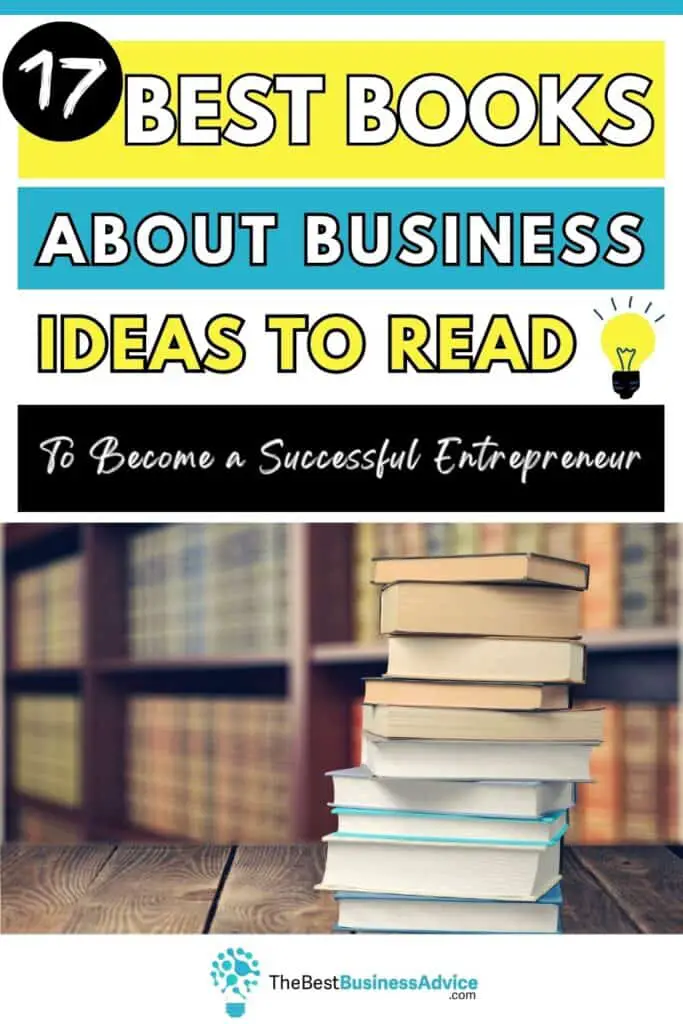17 Best Books About Business Ideas To Read To Become A Successful Entrepreneur
It is a misconception that entrepreneurs are born with an inherent gene for success or have their way paved by family money and connections. While the latter is an undeniable asset, people without the “right” degree or background are capable of transforming ideas into profitable ventures.
Thus, we’ve gathered 17 of the best books about business ideas to help you reach your entrepreneurial goals.
The best books about business ideas are:
Table of contents
- 1. All-in On AI: How Smart Companies Win Big With Artificial Intelligence By Thomas H. Davenport
- 2. Build: An Unorthodox Guide To Making Things Worth Making By Tony Fadell
- 3. The Creative’s Guide To Starting A Business: How To Burn Your Talent Into A Career By Harriet Kelsall
- 4. Dare To Lead: Brave Work. Tough Conversations. Whole Hearts. By Brené Brown
- 5. Entrepreneurial You: Monetize Your Expertise, Create Multiple Income Streams, And Thrive By Dorie Clark
- 6. Fall In Love With The Problem, Not The Solution: A Handbook For Entrepreneurs By Uri Levine
- 7. The Future Is Faster Than You Think: How Converging Technologies Are Transforming Business, Industries, And Our Lives By Peter Diamandis And Steve Kotler
- 8. How Big Things Get Done: The Surprising Factors That Determine The Fate Of Every Project, From Home Renovations To Space Exploration And Everything In Between By Brent Flyvbjerg
- 9. It’s About Damn Time: How To Turn Being Underestimated Into Your Greatest Advantage By Arlan Hamilton
- 10. Jump: Dare To Do What Scares You In Business And Life By Kim Perell
- 11. Making Ideas Happen: Overcoming The Obstacles Between Vision And Reality By Scott Belsky
- 12. Shortcut Your Startup: Speed Up Success With Unconventional Advice From The Trenches by Courtney Reum And Carter Reum
- 13. See, Solve, Scale: How Anyone Can Turn An Unsolved Problem Into A Breakthrough Success By Danny Warshay
- 14. Start With Why: How Great Leaders Inspire Everyone To Take Action By Simon Sinek
- 15. Where To Play: 3 Steps For Discovering Your Most Valuable Market Opportunities By Marc Gruber And Sharon Tal
- 16. Will It Fly? How To Test Your Next Business Idea So You Don’t Waste Your Time And Money By Pat Flynn
- 17. Zero To One: Notes On Startups, Or How To Build The Future By Peter Thiel
- Wrap Up
- PIN THIS FOR LATER…
1. All-in On AI: How Smart Companies Win Big With Artificial Intelligence By Thomas H. Davenport
Technology is moving faster than ever, changing the face and pace of business. The latest disrupter is AI. Thus, Harvard Business Review Press has released All-in On AI, Thomas H. Davenport, and Nitin Mittal’s take on turning this new tech into an advantage.
While the book focuses on large companies using it, AI is not something entrepreneurs can ignore. Developing a strategy that will be outdated before your business gains its legs is a waste of time. Far wiser to acknowledge the future and develop ideas on how to embrace it as you progress with your ideas.
A must-read for any forward-thinking entrepreneur.
2. Build: An Unorthodox Guide To Making Things Worth Making By Tony Fadell
Tony Fadell, the man who gave the world the iPod and iPhone, has written Build to help people trying to launch their businesses and those trying to bring new ideas within a company. Fadell’s business-mentorship-like advice focuses beyond the stereotypical inventor and encompasses all types of builders, including people trying to create a new business, a department, or a career.
Fadell’s book is engaging, injecting humor into his insight and advice. Stories and antidotes serve as examples of his lessons that are meant to be practical and inspiring. It gets the brain going while showing paths to bring those ideas to fruition.
3. The Creative’s Guide To Starting A Business: How To Burn Your Talent Into A Career By Harriet Kelsall
Artistic creativity isn’t usually positioned as an asset to making it in the business world. But Harriet Kelsall believes otherwise, hence her award-winning book The Creatives Guide to Starting a Business.
Her book guides readers on transforming a creative passion into a profitable business. Her exercises get the mental gears turning, helping you look at your talent through a new lens and assess its business potential. She also tells readers how to write a business plan, research prospective markets, price products or services, and successfully promote a new startup.
Kelsall’s writing is humorous and approachable while being informative. A good read for any artist looking to branch out into being an entrepreneur.
4. Dare To Lead: Brave Work. Tough Conversations. Whole Hearts. By Brené Brown
Entrepreneurs need to be leaders. Unfortunately, too many believe this is only important if you are a CEO of a Fortune 500 company. But Brené Brown has found it matters at all levels of business, even a lone entrepreneur gearing up for their first venture.
In Dare to Lead, Brown calls for bravery embedded in values. It means being willing to unlearn in addition to acquiring knowledge. It takes a wiliness to have uncomfortable conversations and show up even when you’d rather hide.
Because there is a difference between leading and being bullheaded. Stubbornness might keep you from giving up, but it won’t necessarily lead your venture to success. However, it takes practice and a wiliness to look within to be able to tell the difference.
5. Entrepreneurial You: Monetize Your Expertise, Create Multiple Income Streams, And Thrive By Dorie Clark
Dorie Clarks’s Entrepreneurial You shows how to juggle multiple income stream ventures to ensure a profitable and independent career. In our ever-changing world, being dependent on a single source of income revenue is risky.
Instead, she encourages layered management of skills and ventures so your brand and talents can flex with technology disrupters and shifting trends.
In addition, Clark outlines ways to make money using talents and activities you already love. The book is perfect for those who are looking to make it on their own but have yet to find a way to make the leap.
6. Fall In Love With The Problem, Not The Solution: A Handbook For Entrepreneurs By Uri Levine
Uri Levine, the cofounder of Waze, is known for building two “unicorns,” companies valued over a billion dollars. In his handbook Fall in Love with the Problem Not the Solution, he details his recipe for success and how other entrepreneurs can reach their goals.
His book delves into subjects such as:
- Hiring and firing
- How to get funding
- Determining the best time to sell
It is a highly worthwhile read for all entrepreneurs, even if billion-dollar unicorns are not your dream.
7. The Future Is Faster Than You Think: How Converging Technologies Are Transforming Business, Industries, And Our Lives By Peter Diamandis And Steve Kotler
The future is here, revolutionizing how businesses are launched and run. Even how we reach out to our networks and target market is evolving faster than ever. Peter H. Diamandis and Steven Kotler tackle this brave new world in their book The Future is Faster Than You Think.
While upheaval and disruption are causing chaos and panic in many businesses, they argue it is also one of the most significant wealth-creating opportunities.
They explain how these changes will impact our lives, including how we raise children, experience healthcare, and obtain our food. Yet the book isn’t out to scare you. Instead, it encourages readers to appreciate the revolution rather than fear it.
8. How Big Things Get Done: The Surprising Factors That Determine The Fate Of Every Project, From Home Renovations To Space Exploration And Everything In Between By Brent Flyvbjerg
Oxford professor Bren Flyvbjerg has a reputation as “the world’s leading megaproject expert.” His book How Big Things Get Done dives into how complex and visionary projects are completed, such as going to space.
However, he believes the same techniques used to produce successful billion-dollar ventures can also be used in more modest pursuits, such as renovating your own home or one you intend to flip.
Flyvbjerg breaks down the process of legendary projects like the Empire State Building and the iPod. He shows how they managed to meet tight deadlines without blowing the budget. He also demonstrates where infamous projects went wrong and why they missed their deadlines, costing over twice the projected amount.
Capitalizing on years of research and experience, Flyvbjerg demonstrates that planning isn’t the only crucial stage of meeting a project’s goals. Entrepreneurs and business leaders also have to understand the art of delivery to achieve cost-effective and timely results.
9. It’s About Damn Time: How To Turn Being Underestimated Into Your Greatest Advantage By Arlan Hamilton
Arlan Hamilton understands what it is like to have nobody think you can succeed. In her book It’s About Damn Time, she details what it was like to arrive in Silicon Valley as a Black, gay woman without a degree or money to rent a place to sleep.
Instead, she’d taught herself and brought with her an aging laptop, a plethora of ideas, and a refusal to quit. She doesn’t claim it was easy. However, she maintains entrepreneurs can make it without an MBA or connections to the elite.
Her story demonstrates that while determination and grit are crucial, so are focus, research, and a wiliness to learn on the ground. She also keeps an eye out for unique opportunities that the market is missing rather than those reinventing what already exists. Her book is an inspiration to anyone who doesn’t fit the typical image of an entrepreneur.
10. Jump: Dare To Do What Scares You In Business And Life By Kim Perell
Award-winning entrepreneur Kim Perell hasn’t always been successful. In her book Jump, she shares the worst period in her personal and professional life. Bankrupt and desperate for a career change, she had to muster together a “One-Year Success Plan” to set her on the path of multi-million-dollar success.
Her book is a far cry from fluffy inspiration. Instead, her engaging story is laced with researched back data and provides study guides to get entrepreneurs out of their rut and “jump” into a new trajectory. A perfect read for anyone who is feeling stuck and needs a kick in the pants to seize their dreams.
11. Making Ideas Happen: Overcoming The Obstacles Between Vision And Reality By Scott Belsky
Scott Belsky’s Making Ideas Happen is an excellent read for creatives struggling to organize their ideas. It is a handy read for those who work in creative teams that have to sort through a plethora of excellent yet conflicting ideas.
He points out where people waste time and create extra work for themselves and their teams. For example, many become captivated by prolific note-taking and filing, a timely practice with little value. Instead, he suggests efficient and easy-to-use transitional tools. He also outlines habits, behaviors, and leadership traits that readers can develop to further their goals.
Capitalizing on Belsky’s organizational system and mindset will enable creative entrepreneurs to execute their ideas successfully and achieve a rewarding career.
12. Shortcut Your Startup: Speed Up Success With Unconventional Advice From The Trenches by Courtney Reum And Carter Reum
Brothers Courtney and Carter Reum use their experience as investors and entrepreneurs to guide readers through launching their own venture in Shortcut Your Startup.
The brothers have broken down the process from starting with an idea to running the actual business. They show you where to invest the bulk of your time, where you should outsource, and what makes a risk good versus one best avoided.
The Reum Brothers also have advice for entrepreneurs who already have a running business. They tackle subjects such as how to raise performance, increase momentum, how to pivot a brand, and how to capitalize on selling your venture and where to head next.
13. See, Solve, Scale: How Anyone Can Turn An Unsolved Problem Into A Breakthrough Success By Danny Warshay
See, Solve, Scale is a distilled version of The Entrepreneurial Process, Brown University’s highly rated course taught by author Danny Warshay. The professor has inspired many students to start their own ventures.
However, Warshay firmly believes that attending an Ivy League is not a prerequisite to becoming a successful entrepreneur. Instead, he views it as a process that anyone can be taught. All it takes is the wiliness to learn and put the lessons into practice: find a problem and make it the solution to your business dreams.
The book is highly structured, as one would expect from a professor, and consists of research-based insights, real-world examples, and a guide through the three-step process. He also outlines the most common errors people make when embarking on new projects and how to prevent these mistakes from sabotaging your own success.
Thus, if you are looking for a meaty business read with practical advice and less cheerleading, Warshay’s book is an excellent choice.
14. Start With Why: How Great Leaders Inspire Everyone To Take Action By Simon Sinek
Simon Sinek’s TED Talk “Start With Why” is one of the most-watched TED videos. But the real meat of his idea is found in his book by the same name, Start With Why. He demonstrates why inspiration matters in new ventures and in the workplace. That leaders that inspire creates innovation and loyalty in every aspect of business, including customers.
Sinek dubs this influential framework The Golden Circle and believes it can be built into an organization, big or new emerging. At the core of this inspiration is the answer to “why?” When leaders communicate the why of what is being asked, be it the goals of the venture to a task, it creates motivation and commitment.
15. Where To Play: 3 Steps For Discovering Your Most Valuable Market Opportunities By Marc Gruber And Sharon Tal
Where to Play by Marc Gruber and Sharon Tal focuses on one of the most frequently overlooked aspects of innovation: the market. The book helps readers create a strategy for finding market opportunities that fit with their goals. Having a plan in place will prevent regrettable impulse choices and instead enable strategic decision-making.
The book includes reusable worksheets to practice putting the strategy into practice. The main three themes are:
- Market Opportunity Set
- Attractiveness Map
- Agile Focus Strategy
An excellent method to evaluate market opportunities so you can lead your venture down the optimal path.
16. Will It Fly? How To Test Your Next Business Idea So You Don’t Waste Your Time And Money By Pat Flynn
Pat Flynn gives practical advice to entrepreneurs in his book Will it Fly? Getting a business idea (or twenty) isn’t a problem for many people. Instead, the issue is not thoroughly testing the vision before creating a business based on it.
At first, vetting an idea may seem like a roadblock. It takes time to thoroughly test the product and examine if potential customers will respond as hoped. Thus, this essential phase of developing a business is often viewed as a vulnerable period where someone else may steal the idea and beat you to market.
But as Flynn points out, one of the most common reasons entrepreneurs fail is that they rushed a concept into a fully-fledged business before they knew if their idea was as good as it initially seemed. The consequence goes beyond disappointment, costing an entrepreneur far more time and money than they would have spent on the vetting stage.
It’s not only a recommended read for how to test new concepts. If you are the sort that brainstorms as easily as breathing, the book will also help you find focus, so you can capitalize on the idea that is most likely to lead to success.
17. Zero To One: Notes On Startups, Or How To Build The Future By Peter Thiel
Peter Thiel and Blake Masters’ created a modern entrepreneur classic with Zero to One. Thiel draws from his own experience as PayPal cofounder and as an investor in businesses such as Facebook and SpaceX.
The authors demonstrate why coming up with new ideas rather than reinventing the wheel increases the odds of success.
When copying an existing idea, the new venture competes with a piece of an existing market. But when a forward-thinking business produces a new product or service, it has a monopoly. Thus, the profits are theirs to use to grow and innovate further. A valuable read for people looking for inspiration for creating an original business.
Wrap Up
It is an exciting time to be an entrepreneur. AI and other technology are changing the game and creating new problems that need to be solved. But even an excellent idea requires a plan to reach success.
The 17 books on our carefully curated list are full of practical advice that will motivate, inspire, and guide you on your way to achieving your business goals.
PIN THIS FOR LATER…
DID YOU FIND THIS INFORMATION HELPFUL? Share the love on social.
Follow us on Pinterest & Instagram!
ANY OTHER BUSINESS ADVICE WE CAN WRITE ABOUT?
Let us know, email us at: Advice@TheBestBusinessAdvice.com









